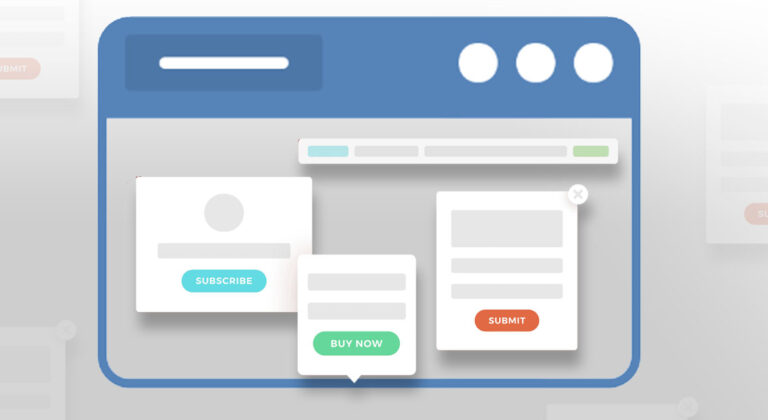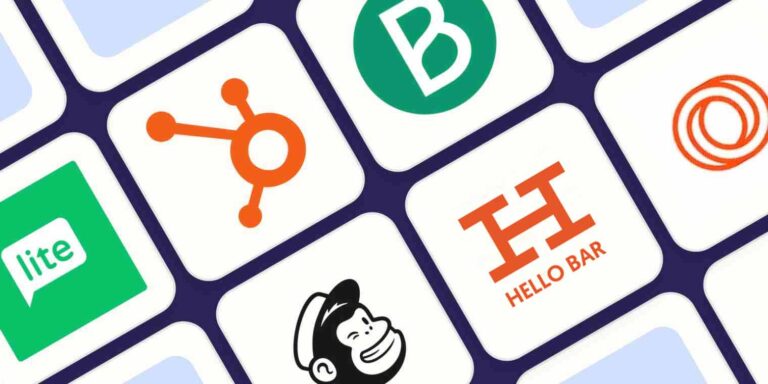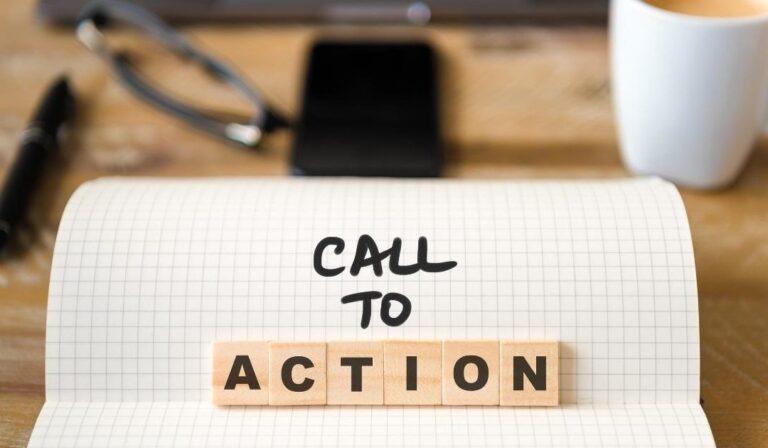Newsletter Subject Lines: Tips to Create Yours In Under 1 Minute

I hope you enjoy this blog post. If you want Hello Bar to grow your leads, click here.
Author:
Ryan Bettencourt
Published
July 5, 2024
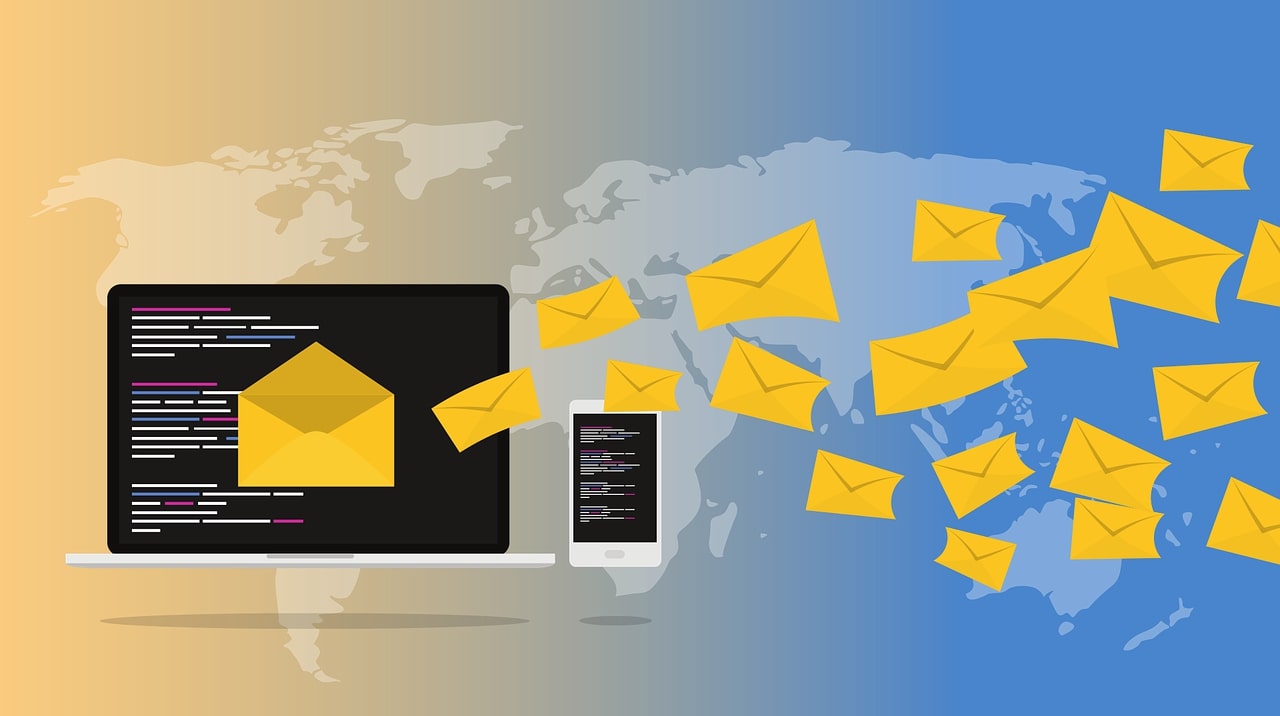
How hard can it be to write simple newsletter subject lines? After all, it’s just a few words strung together to grab attention, right? Think again.
The truth is, crafting an effective subject line can be tricky. You must deeply understand your audience, think outside the box, and let your creative juices flow.
To emphasize the need to create compelling subject lines, consider this stat. Nearly 65% of marketers worldwide personalized their email subject lines in 2023.
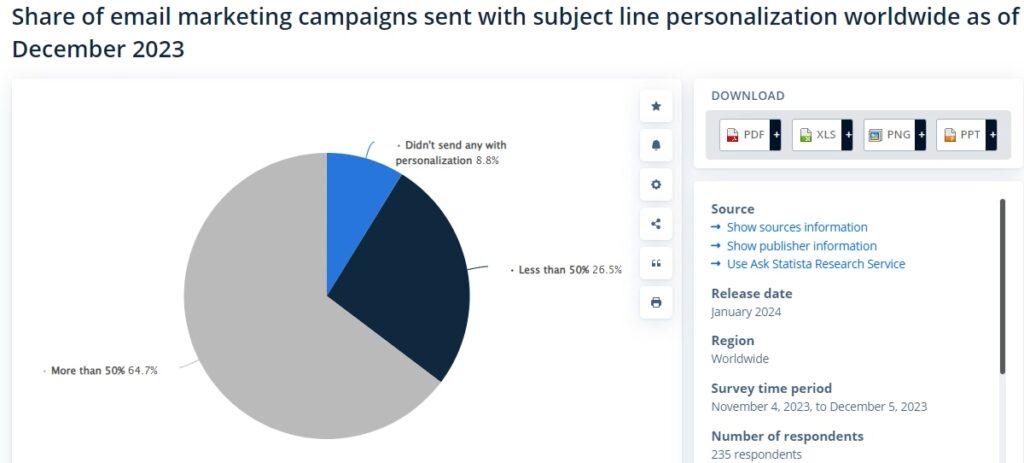
Image via Statista
When we look at other email marketing statistics, it is clear that catchy newsletter subject lines are crucial in boosting the open rate.
If you want to learn how to write such subject lines, this post is just for you. We’ll uncover the secrets to writing informative and catchy email subject lines in under a minute.
Let’s get straight into it!
Why Are Your Newsletter Subject Lines Important? And Why Do You Need to Pay Attention to Them?
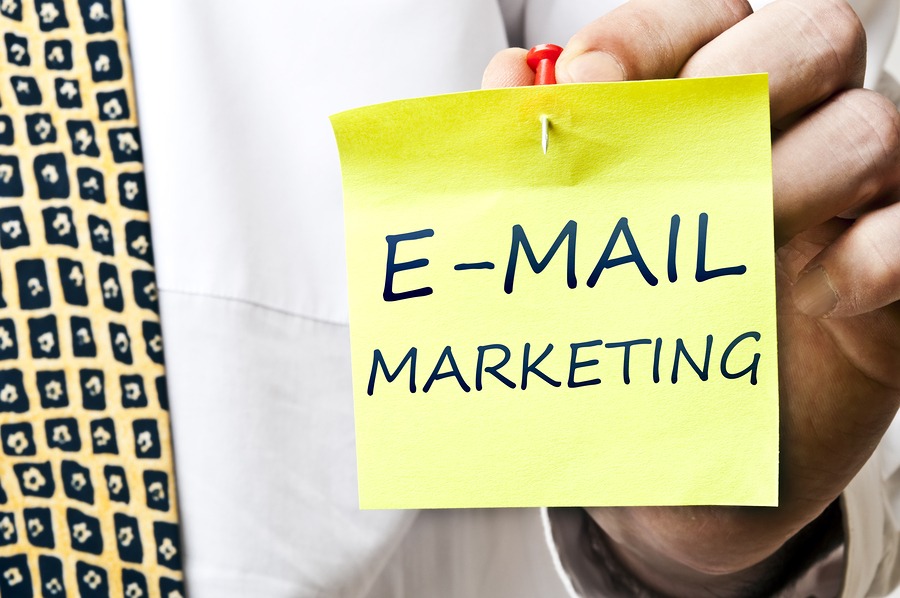
Email marketing is a tricky business. If you master email copywriting, you’ll increase open rates, click-through rates, and engagement rates.
That’s reason enough to pay attention to your newsletter subject lines.
Here are some of the important reasons you should consider:
First Impressions Matter
Your email subject line is the first thing recipients see in their inbox. It determines whether they open or ignore your email.
A great email subject line can capture attention and entice the reader to open the email. Conversely, a bland newsletter subject line may be overlooked or even deleted, no matter how valuable the content inside might be.
Set the Tone
A well crafted subject line sets the tone for your email. It gives recipients a clue of what to expect from the content that follows. Whether you want to spark excitement, create urgency, or provide a casual update, your email subject line must accurately reflect the content within the newsletter.
Stand Out in Crowded Inboxes
Do you know that over 333 billion emails are sent daily worldwide? How can your newsletter stand out in your recipients’ inboxes?
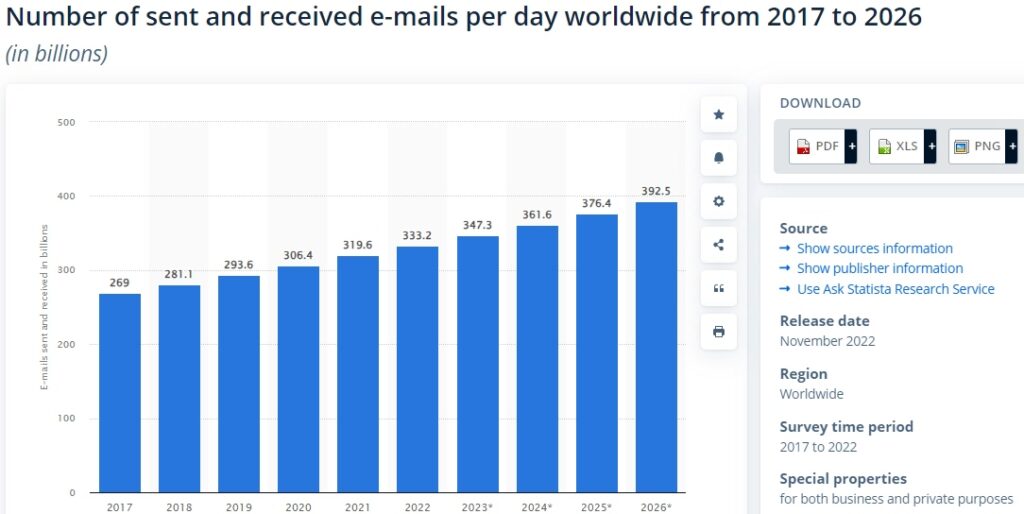
Image via Statista
The key lies in creating captivating email marketing subject lines that encourage subscribers to click through to your newsletter and interact with your content.
Avoid the Spam Folder
Email clients, such as Gmail and Yahoo, are cracking down on spam in a big way. In fact, by 2023, spam messages constituted 46.8% of worldwide email traffic.
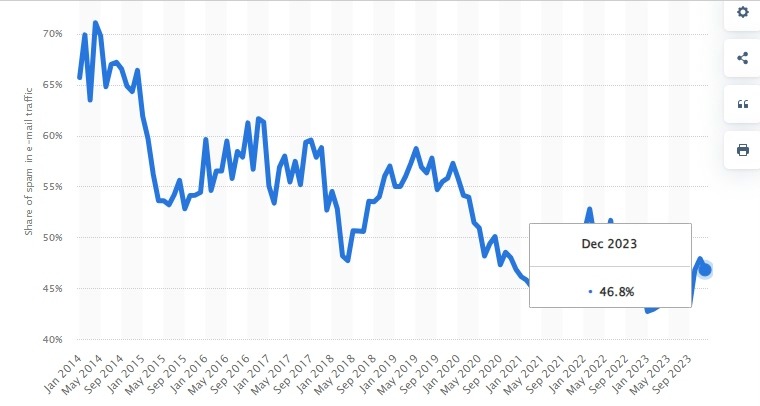
Image via Statista
To ensure your newsletter email is not marked as spam, craft clear, concise and professional subject lines. Avoid using too many exclamation marks or spammy words like free, urgent, or guaranteed to steer clear of spam folders.
Encourage Immediate Action
A good email subject line can spark curiosity and prompt your recipient to act immediately. For instance, a subject line indicating a limited-time offer, an exciting announcement, or a critical update can motivate readers to open the email and take action without delay.
What Are the Factors That Make a Great Newsletter Subject Line?

Okay, so email newsletter sunline lines are important. We get it. But what constitutes a great subject line?
1. A Sense of Urgency and Scarcity
These are two of my favorite words in the marketing lexicon. If you can make your reader feel compelled to open your email through urgency or scarcity — or both — you’re doing your job right.
Limited time only! Just a few products left in inventory! Do you want to make a change today?
All of these phrases spur your reader into action. But get creative and put your own spin on them.
2. A Personal Message to the Reader
If it’s possible, address your reader by name. Personalization feels intimate and interesting. People are more likely to click if they see their names.
In fact, using names in newsletter subject lines can be more effective than using them in the bodies of emails. Think about it. How do your friends start an email?
They might say “Hey!” or “How’s it going?” They probably don’t write, “Dear Mike.”
3. Relevance to Your Reader
Consumers are pretty savvy these days. They value their time and energy. If a newsletter subject line doesn’t seem relevant, they won’t bother opening it.
That’s why you need to address a specific pain point or desire in your newsletter subject lines. What do you know about this segment of your email list?
Are your readers tired, hungry, overscheduled, dissatisfied, or anxious? Use those emotions in your newsletter subject lines.
Do your readers want to make more money, lose weight, find a better house, travel more often, or dress more fashionably? Again, hit those desires in the newsletter email subject lines.
4. Engaging Your Readers’ Curiosity
Perhaps curiosity killed the cat, but it also got your emails opened more often. We’ll call it a draw.
Humans have a natural desire to satisfy curiosity. That’s why, back before DVRs and Netflix, people were willing to sit through mind-numbing commercial breaks to find out what would happen next on their favorite television shows.
Use that to your advantage. Asking a poignant question in your newsletter subject lines or alluding to a secret can vastly improve your open rates.
5. Offering Something Special for Your Readers
Think of your email list as a special club. Members only, right?
We like to feel special, appreciated, and valued. You can help your readers feel that way by offering up something special.
Maybe it’s a discount only your subscribers get, a free shipping offer that lasts one month, or a free copy of one of your digital products.
6. Initiating a Great Story
Storytelling is one of the best ways to improve your newsletter subject lines. Think of the subject line as your story’s hook. It’s what gets your email recipients to turn the page — or, in this case, open the email.
Upworthy and similar sites do a great job of this with their article headlines.

You can follow their example, but make sure you deliver on the subject line’s promise.
7. Brevity, Clarity, and Power
You’ve heard the phrase “pack a punch,” right? That’s what your newsletter subject lines need to do — in as few words as possible.
Start with a strong verb. Use a thesaurus if you have to.
Write your headline. Use as many words as you want. Then start pruning.
Remove every word you don’t need and that doesn’t clarify your message. Try to use as few “stop words” as possible.
8. Humor and Emojis Carefully
It’s possible to go overboard here. If you’re not careful, you’ll just irritate your subscribers.
One emoji is okay. Two might be all right. Three or more is overdoing it.
And if you’re using an emoji, you’d better have a darn good reason. It should replace a word in your newsletter subject line or add a dose of humor to the message.
9. Numbers and Statistics
Catchy newsletter subject lines often contain numbers or statistics. Why? We’re drawn to them.
But it can’t be just any number. It should be impactful. Consider the statistic we use on the Hello Bar exit intent popup.
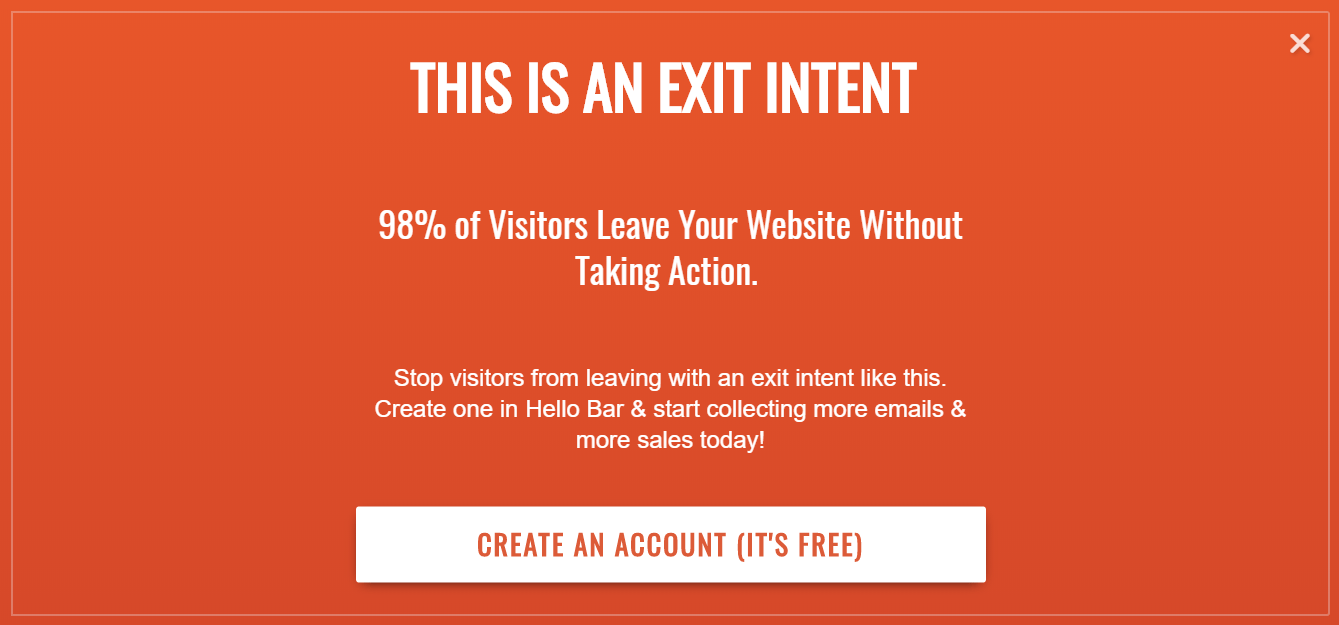
The number is really surprising, so it captures interest.
Similarly, if you’re giving your readers a list, it should be worth the click to open your email. Don’t give people two tips or 10 tips. Give the, 101 tips.
10. Calls to Action
You know you need to use awesome call-to-action phrases within your email body, but what about the subject line? It can work, but only if it’s directly appealing to your audience. You need to hit a pain point or desire pretty hard for it to work.
- Fear of Missing Out: We’re all vulnerable to FOMO, right?
- Vanity: Can you help your reader look better?
- Greed: People want to earn more money. Can you help?
- Sloth: How can you make something easier or faster for your readers?
- Pain Points: What’s troubling your readers right now?
6 Most Common Newsletter Subject Line Mistakes
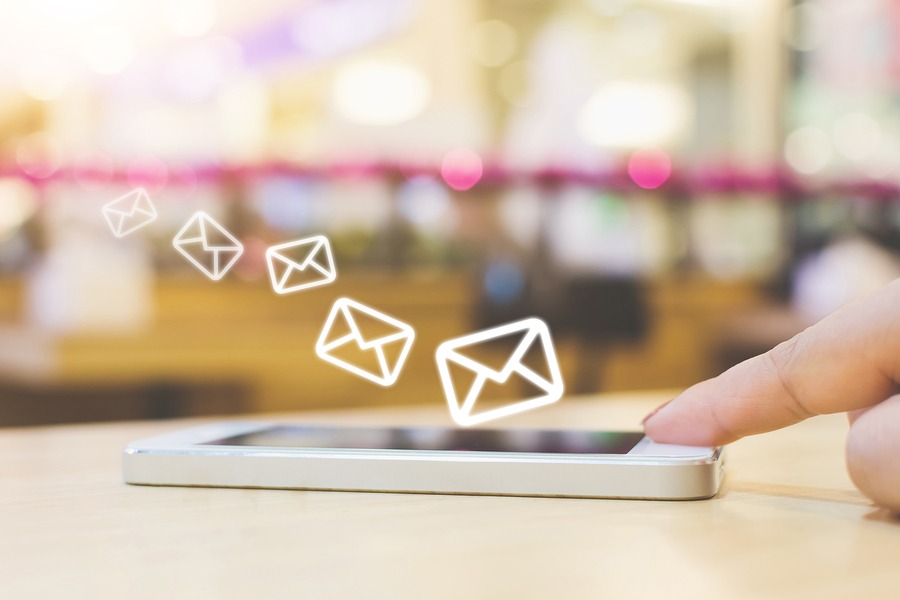
Before I show you some of the best inspirational newsletter subject lines, I want to highlight what you might be doing wrong. Avoiding these common mistakes can keep your emails out of the spam folder, improve your open rate, and boost your reputation among your subscribers.
1. It’s Too Promotional
You’re proud of your product or service, so it’s natural to want to shout about how great it is. Resist the urge.
Newsletter subject lines should be about the reader only. If you’re too busy touting your product, you’ll turn people away.
This doesn’t mean you can’t announce a special sale or discount. Just don’t use lots of superlatives and adjectives to do it. Focus on what the reader will gain from opening the email.
2. It’s Too Click-Baity
Clickbait has a time and place, but you have to tone it down. If the reader will feel cheated upon opening the email, your newsletter subject lines need work.
Keep three words in the back of your mind: Truth In Advertising. Make sure your newsletter subject lines are a direct reflection of the email body. If they’re not, tweak them until they fit.
3. It Use Words that Scream “SPAM”
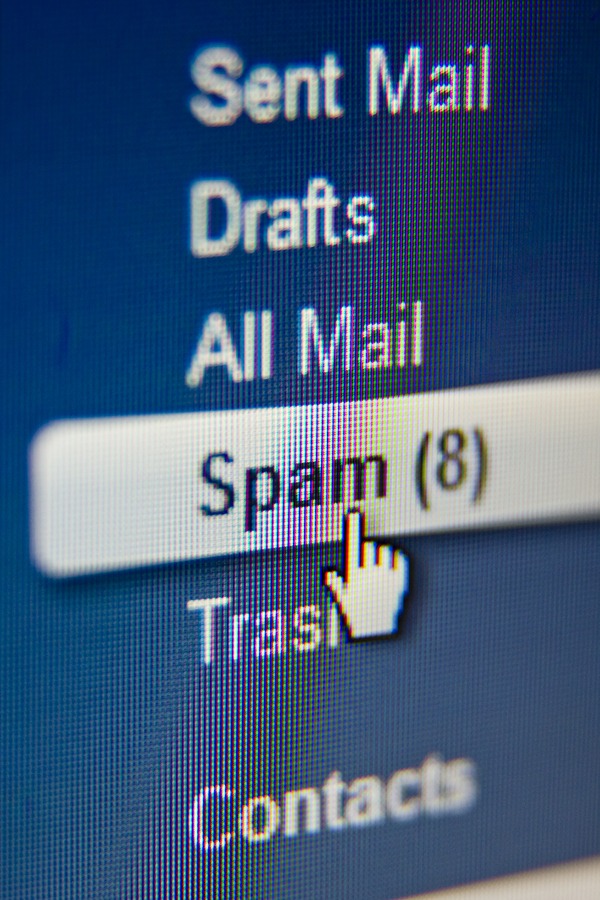
Some words are simply no-nos for email subject lines. Words like free, spam, no cost, investment, inventory, cash, stock alert, and others automatically trigger spam bots.
The best way to avoid spam trigger words is to write like a normal person would speak. That will keep you on the right side of the spam filters so you don’t have to worry about not reaching your subscribers.
4. EVERY WORD IS WRITTEN USING CAPS
All-caps text is annoying for most readers. It’s not as easy to read as sentence or title case, and many people perceive it as the written version of yelling.
In most situations, sentence case works best. Write your newsletter subject lines as if you were writing a regular sentence — with punctuation and all. Capitalize the first letter of the sentence, but keep everything else lowercase.
5. It’s Not Optimized for Mobile Users
More than half of all emails sent get opened on mobile devices. That’s incredible. If your newsletter subject lines aren’t optimized for mobile users, you could lose 55 percent of your audience.
Don’t risk it. Keep your newsletter subject lines brief, and don’t use any special characters that mobile operating systems might not be able to read.
6. It’s Not Original – It Looks Like All the Other Newsletter Subject Lines
Originality is a tough thing to harness. On one hand, there’s no such thing as true originality. If you think of something, someone else has thought of it before.
But don’t let that stop you from getting creative. Focus on crafting subject lines that’ll seem fresh and original to your audience. Consider looking for inspiration in a completely different industry, for instance. Then figure out how you can rework it for your audience.
In some cases, it comes down to substituting common words for unique ones. Instead of saying “Get your discount,” for instance, you could say, “Snag your discount” or “Seize your discount.” See what I mean?
21 Super Effective Newsletter Subject Lines Examples and Ideas

Now, it’s inspiration time. Let’s look at some of the most effective and clickable newsletter subject lines we’ve ever seen. Don’t copy them, but feel free to emulate their approach. Remember, you have to be original.
1. “[URGENT] You’ve Got ONE DAY To Watch This…” – Digital Marketer
The first two subject line examples come from Digital Marketer, and for good reason. They’re great at email marketing, so we urge you to read their work to get tips and clues for better newsletter subject lines.
This one is pretty much perfect. It reeks of urgency and scarcity, which, as we mentioned above, are almost guaranteed to get people to click. Plus, it inspires curiosity because the reader doesn’t know what “this” is until he or she opens the email. Genius.
2. “[WEEKEND ONLY] Get This NOW Before It’s Gone…” – Digital Marketer
Here’s another subject line example from Digital Marketer that’s brilliant in its subtlety. It’s perfect for mobile users — short and sweet — and it begins with the FOMO-inducing phrase “Weekend Only.”
Notice that the email subject line is only eight words long, yet it manages to hit the scarcity pain point twice. First, you only have the weekend to get it (urgency), and second, you’d better hurry because it might be gone soon (scarcity).
3. “Last Day To See What This Mystery Email Is All About” – Grubhub
Who doesn’t love Grubhub? It’s a great business model for people who love convenience when it comes to their food. Plus, the company has a fantastic email marketing campaign.
This is my favorite of its newsletter subject lines because it uses the phrase “mystery email.” I never would have thought of it, but it strikes a chord. Starting with “Last Day” is also smart because it tells people unequivocally that they’d better act now.
4. “9 Disgusting Facts about Thanksgiving” – Eat This Not That
Here’s proof that you don’t have to be all sunshine and sprinkles with your newsletter subject lines. Eat This Not That inspires curiosity and anxiety by promising to share nine gross things about Thanksgiving.
5. “10 Bizarre Money Habits Making Millennials Richer” – Refinery29
Desire is a great motivator when it comes to newsletter subject lines. If you can pinpoint what your readers want, you’ll get them to open your emails.
Refinery29 achieved this by using curiosity in conjunction with desire. The simple subject line promises “bizarre money habits,” then follows up by explaining that these habits are filling Millennials’ bank accounts.
6. “Age-Defying Beauty Tricks” – Le Mer
We discussed vanity above, so it’s no wonder that Le Mer scores a big win with this catchy email subject line. It’s short — just four words — which makes it extremely mobile friendly. And although it isn’t overt about hitting a pain point, the phrase “age-defying” will trigger anyone who’s worried about looking older.
7. “Don’t Wear Last Year’s Styles.” – Guess
We all agree that Guess has consistently been great at marketing, from television and radio to the Internet and email marketing. This newsletter subject line is ideal.
Essentially, it’s playing off readers’ worst fears: That they’re wearing last year’s styles and everyone knows it. Again, we’re talking about vanity, but this doesn’t promise anything specific. It simply triggers anxiety and curiosity.
8. “New Must-Haves For Your Office” – HP
You don’t have to look much farther than Pinterest to know that office design has become an obsession for men and women all over the world. Not only do they want functional, efficient equipment and supplies, but they want their offices to look good.
That’s why HP used a series of newsletter subject lines geared toward helping people build the perfect office space.
9. “Get Priority Access.” – The Black Tux
Exclusivity is a powerful way to drive email opens. People want to feel like they’re special and part of an exclusive crowd. That’s why this newsletter subject line from The Black Tux works so well.
From the subject line, we don’t know what “priority access” means. But we want to find out. We have no idea what the email contains. We’re going to click to see.
10. “Steal These Email Templates…” – Digital Marketer
Okay, okay, we know we’ve been stealing a lot of ideas from Digital Marketer, but we promise this is the last one. We chose it because it’s one of the best newsletter subject lines for keeping your audience engaged and appreciative.
First, the word “steal” is intriguing. It’s taboo, after all — you’re not supposed to steal. Yet Digital Marketer is inviting you to do just that. Plus, it promises something special and of value.
11. “Get More Kitchen Space With These Easy Fixes” – IKEA
Nobody would argue that IKEA knows its audience. The Swedish giant focuses on helping its core customers use their spaces more efficiently without sacrificing on quality.
And that’s exactly the pain point this subject line hits. You can get more kitchen space, but it won’t take long or require too much effort. Sold!
12. “Learn a Language With Only 5 Minutes Per Day” – Duolingo
Duolingo is a mobile app that helps you learn another language — and, as the subject line above says, you can do it in just five minutes per day. This hits on the pain point of lack of time. Prospects want to learn another language, but they have a small window in which to do it.
13. “Stop Wasting Time on Mindless Work” – Evernote
Sometimes, you have to tell your prospects what to do — or, in this case, what not to do. Evernote has hit on a familiar pain point in a beautifully simplistic way.
Instead of saying “5 Ways to Reduce the Time You Spend on Mindless Work,” Evernote issues a command: Stop Wasting Time…” We think it’s more effective this way.
It hits a pain point without giving too much away. The reader has to open the email to find out what goodies Evernote might have in store for him or her.
14. “Feed Your Guests Without Breaking The Bank” – Pizza Hut
Everyone loves a party or get-together, but nobody enjoys the incredible expense that comes with it. Simply preparing a meal for a few of your closest friends can set you back a few hundred bucks, from the appetizers to the wine and cocktails.
Pizza Hut issues a solution to the problem with this email. Have your party, enjoy the company, but don’t break the bank. Plus, who says “no” to pizza?
15. “Happy Birthday John – Surprise Inside!” – Rent The Runway
We’re a big fan of personal email subject lines. In sales, for instance, we want to remember our customer’s full name, his or her spouse’s name, the person’s favorite hobby or sport, and any other details that might help me connect.
In fact, all great salespeople do that. You have to love learning about people and memorizing their most important qualities.
However, when it comes to writing email newsletter subject lines, it’s just as important. If you make the effort to remember a prospect’s or customer’s birthday, you can celebrate that event with him or her.
This is a great subject line from Rent The Runway. Not only does it wish the customer a happy birthday, but it offers a gift to memorialize the occasion.
16. “Mary, Earn double points today only” – Jersey Mike’s Subs
Now if this is not a perfect combo, then we don’t know what is. Nothing hits home harder than personalized newsletter subject lines coupled with a sense of urgency. This subject line makes the reader feel as if the offer is specially created for her.
Personally, we would even feel guilty for not earning those points before the deadline. What’s more, by highlighting an exclusive deal (earning double points), Jersey Mike’s Subs adds value to the email. It makes the reader feel like they are getting something special and worthwhile.
17. “What They Eat In Prison” – Thrillist
You have probably heard the horror stories associated with prison food but you’ve never really dug deeper. This subject line by Thrillist definitely makes you want to discover more.
Is it bland meat or questionable veggies? Or is it just another myth, and prison food is actually not that bad?
The straightforward and slightly provocative nature of the subject line promises a glimpse into a rarely explored world. The simplicity and directness also entices readers to click and learn more about the reality behind prison meals.
18. “Deals That Make Us Proud (Unlike Our Nephew, Steve)” – Groupon
Some newsletter subject lines are just too funny to ignore. Steve must be quite a handful but at least he inspires many to read Groupon’s emails. We’re definitely opening an email that makes us burst into laughter on a boring Saturday afternoon.
This subject line sparks curiosity and entertains readers. It stands out in the inbox, promising not just great deals but also a good laugh. It represents creativity at its best!
19. “Yes, I’m Pregnant. You Can Stop Staring At My Belly Now.” – Baby Bump
A sprinkle of sarcasm mixed with humor wouldn’t hurt anyone. In fact, it points out a relatable pain point that many expectant mothers experience. The piercing stares from strangers, especially in public, might feel quite unnerving and uncomfortable.
This is a fact that Baby Bump understands too well. This newsletter subject line immediately resonates with pregnant women who have faced similar situations. It establishes a connection with the reader by acknowledging their experiences. This makes readers more likely to open and read the email.
20. “*Don’t Open This Email*”– Manicube
Don’t? Well, now we’re gonna do it anyway! Isn’t it ironic that the word “don’t” is what is likely to nudge your recipients to open the email? Manicube might type “Do” all day but that’s when they won’t even bother. Weird how human curiosity works, right?
This subject line taps into the curiosity and rebellious nature of people. By telling the reader not to do something, it sparks an irresistible urge to do the opposite. It’s a clever psychological trick that makes the email nearly impossible to ignore.
21. “Try To Avoid These 27 People On New Year’s Eve” – Thrillist
New Year’s Eve is a time for celebration, reflection, and resolutions, but it can also be a period of awkward encounters and bad decisions.
This subject line by Thrillist immediately hints at a humorous and relatable list of people readers may want to steer clear of during the festivities. The specificity of “27 people” further increases curiosity, making readers curious about who made the list and why.
FAQs
Q1. What are some effective words to include in newsletter subject lines?
Powerful words to include in newsletter subject lines are those that create a sense of urgency, curiosity, or personalization. Examples include:
- Urgency: “Now,” “Limited Time,” “Hurry”
- Curiosity: “Secret,” “Discover,” “Behind the Scenes”
- Personalization: Using the recipient’s name or location
- Benefits: “Save,” “Exclusive”
- Action: “Join,” “Get,” “Learn”
Q2. What should I avoid when crafting newsletter subject lines?
Here are some pitfalls you should avoid when creating newsletter subject lines:
- Spammy Words: Terms like “Free,” “Guaranteed,” or “Win” can trigger spam filters and annoy your readers.
- Excessive Punctuation: Multiple exclamation marks (!!!) or question marks (???) can appear unprofessional.
- All Caps: This can be perceived as shouting and may also trigger spam filters.
- Misleading or Clickbait Language: Misleading subject lines that don’t match the email content can diminish your readers’ trust.
- Long Subject Lines: Lengthy email subject lines may not be entirely visible on mobile devices.
Q3. Can emojis be used in newsletter subject lines?
Yes, you can use emojis in newsletter subject lines to make them stand out and arouse emotions. However, you must use them sparingly and relevantly. Overusing emojis can confuse your readers and make your email look unprofessional or spammy.
Q4. How can A/B testing improve my newsletter subject lines?
A/B testing allows you to compare different versions of your newsletter subject lines to see which one performs better.
By testing elements such as wording, length, and use of emojis, you can gather data on what resonates better with your audience. This way, you can refine your subject lines for higher open rates, engagement, and conversion.
Q5. How often should I change my newsletter subject lines to keep them fresh?
Each newsletter should have a unique and relevant subject line. Repeating the subject lines may not be a good idea.
Conclusion
Learning from others’ email campaign examples can make you a better marketer. The more you explore new ways to engage your audience, the more effective you become.
Start with your specific niche. For instance, email lead generation practices can vary depending on whether you’re in e-commerce, B2B, SaaS, or some other industry.
Then focus on honing your newsletter subject lines. Use the examples above for inspiration and give them your own spin.
What’s the best newsletter subject line you’ve ever written?



